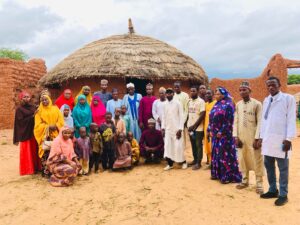The Centre for Information Technology and Development (CITAD) is making strides in closing the digital divide in Nigeria through its annual School of Community Networks Training.
The program, now in its third year, has recently commenced with 30 carefully selected students from across the nation.
Held at CITAD’s Kano Office from August 7th to 11th, the five-day training initiative aims to equip participants with the skills needed to establish, manage, and sustain community networks. The selected students were admitted after an application process.
One of the highlights of the training includes a study tour to the Waire community in Bichi Local Government Area (LGA). Waire, previously underserved in terms of connectivity, was transformed through CITAD’s efforts in collaboration with partners.
PRIME TIME NEWS gathered that the study tour allows participants to witness firsthand the practical implementation of the theoretical knowledge gained during the training sessions.
Haruna Adamu Hadejia, CITAD’s National Coordinator for the School of Community Networks, emphasized that the study tour offers students a unique opportunity to apply their knowledge in a real-world context.
He highlighted the success story of the Waire community, which, two years ago, faced network challenges until CITAD’s intervention.
“Through a partnership with Infratel Africa and an agreement with MTN, networking facilities were installed in Waire community, covering a distance of approximately 2.7 km” Mal. Haruna revealed

Alh. Mustapha Halilu DanWaire, the Ward Head of Waire Community, expressed gratitude to CITAD and its partners for the transformative impact of the connectivity.
Explaining further, the Ward head disclosed prior to the intervention, residents faced challenges such as climbing hills to access network signals, traveling to nearby towns for transactions, and grappling with limited online capabilities.
“Now residents of Waire and neighboring communities, such as Limamai, Zango, Hayi, and Damusa, have experienced significant improvements in their ability to make calls, conduct online transactions, and engage in various online activities” Alh. Mustapha disclosed.
Residents of Waire shared their experiences before and after the intervention. Ibrahim Khalil Shehu expressed relief that they no longer had to climb hills or travel far to access network services. The stability of the network even allowed him to become a MoMo agent, enabling him to offer mobile money services to others.
Mubarak Hudu Waire, a recent graduate, discussed how the intervention improved his academic life. Previously, he had to travel to areas with better network coverage to conduct research and complete assignments. With the new connectivity, he could now comfortably work on assignments from his community.
Abubakar Sani Muhammad, a participant in the study, detailed the technical aspects of network sourcing from satellites through various channels to individual receivers.
He and his fellow students expressed gratitude for the training and pledged to share their knowledge with their respective communities to identify and connect underserved areas.

The Locals highlighted to PRIME TIME NEWS reporter their role in safeguarding the network facilities, recognizing their responsibility as beneficiaries of the services.


